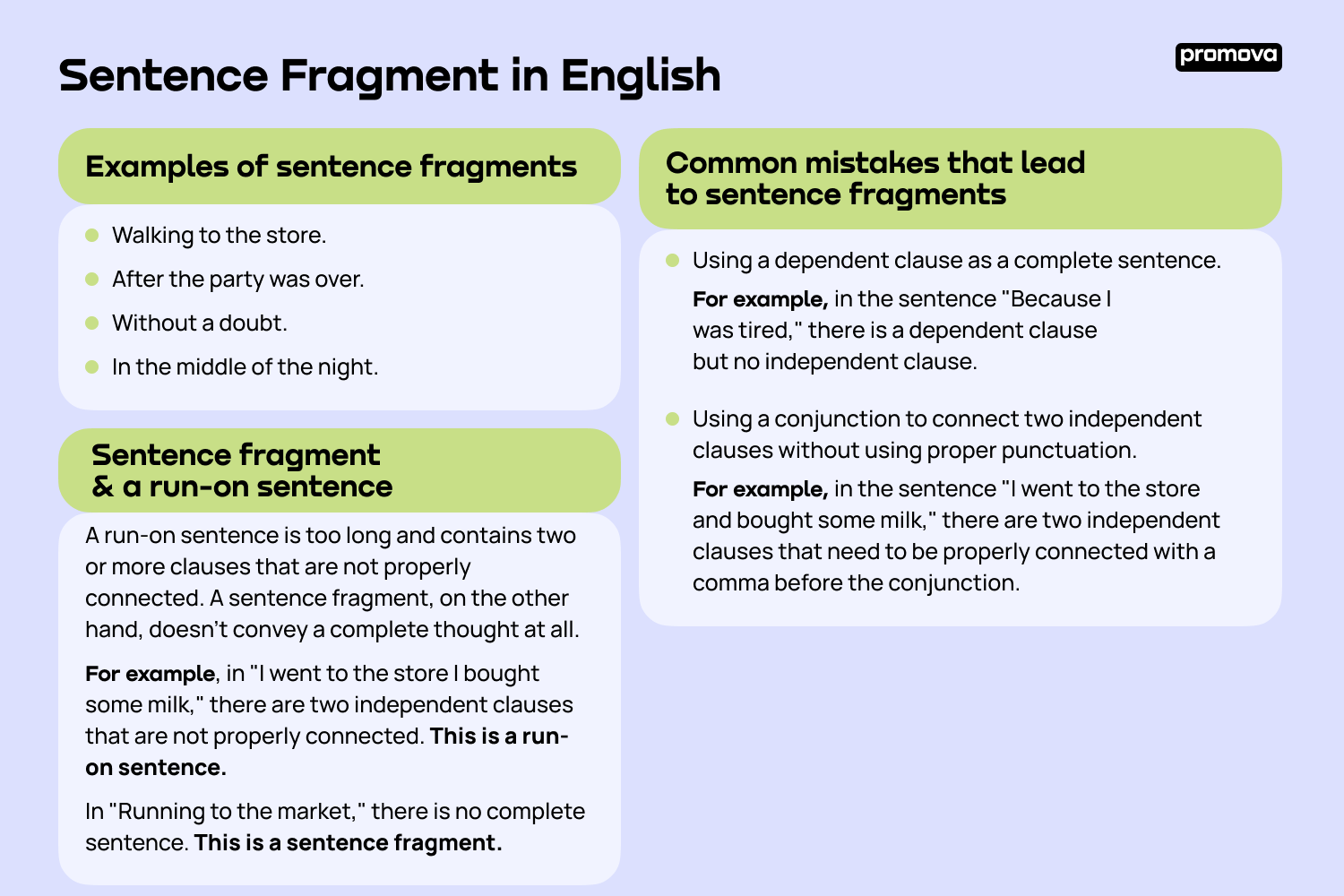Sentence Fragment in English
Contents
In this reference, we will discuss what a sentence fragment is, find many examples of sentence fragments, learn how to identify them, and find out the difference between a sentence fragment and a run-on sentence. You'll also find how to fix this common problem in your own English. Let's start learning!
What is a sentence fragment?
Sentences fragments are sets of words that don't work as a complete sentence. It may be missing a subject, a verb, or both. Sentence fragments can be confusing to readers because they do not convey a complete thought. They can also make writing appear choppy and unprofessional.
Examples of sentence fragments
Here are some examples of sentence fragments:
- Walking to the store.
- After the party was over.
- Without a doubt.
- In the middle of the night.
In each of these examples, there is no complete sentence. They're missing a subject, a verb, or both.
How to identify a sentence fragment
To identify a sentence fragment, ask yourself whether the group of words forms a complete sentence. A complete sentence must have a subject and a verb and must express a thought. If the group of words does not meet these criteria, it is a sentence fragment.
For example, in the sentence "Walking to the park," there is no subject. Therefore, it is a sentence fragment.
So, what makes a sentence a fragment?
As mentioned earlier, a sentence fragment is a group of words that is not a complete sentence. It may be missing a subject, a verb, or both. A sentence fragment can also be a dependent clause that is not connected to an independent clause.
In the sentence "After the party was over," there is a dependent clause but no independent clause. Therefore, it is a sentence fragment.
4
Difference between a sentence fragment and a run-on sentence
A run-on sentence is too long and contains two or more clauses that are not properly connected. A sentence fragment, on the other hand, doesn't convey a complete thought at all.
For example, in "I went to the store I bought some milk," there are two independent clauses that are not properly connected. This is a run-on sentence.
In "Running to the market," there is no complete sentence. This is a sentence fragment.
Common mistakes that lead to sentence fragments
Try to avoid the following:
- Using a dependent clause as a complete sentence. For example, in the sentence "Because I was tired," there is a dependent clause but no independent clause.
- Using a conjunction to connect two independent clauses without using proper punctuation. For example, in the sentence "I went to the store and bought some milk," there are two independent clauses that need to be properly connected with a comma before the conjunction.
How to fix sentence fragments
To fix a sentence fragment, you need to add a subject, a verb, or both. You can also connect the sentence fragment to a complete sentence or rewrite the sentence to make it a complete thought.
For example, if you wanted to fix "Walking to the store," you could add a subject and a verb to make it a complete sentence:
"I was walking to the store."
Alternatively, you can connect it to a complete sentence:
"I was walking to the store when I saw my neighbor."

Summary
Sentence fragments are incomplete sentences that can confuse readers and make writing appear unprofessional. They are usually missing a subject, a verb, or both. To identify a sentence fragment, you need to ask yourself whether the group of words forms a complete sentence. To fix a sentence fragment, you need to add a subject, a verb, or both, or just connect it to an already complete sentence.
Check out more handy grammar references below and learn to avoid more common mistakes!



Comments